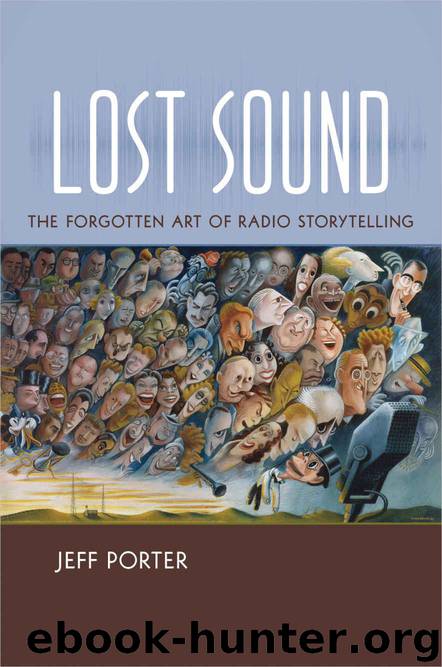Lost Sound: The Forgotten Art of Radio Storytelling by Porter Jeff

Author:Porter, Jeff [Porter, Jeff]
Language: eng
Format: azw3, epub
Publisher: The University of North Carolina Press
Published: 2016-03-10T16:00:00+00:00
For McWhinnie, BBC’s conventional sound effects would not do. In his reading of Beckett’s radio script, All That Fall’s sound design required a more avant-garde treatment, something that would move the poetic center of the play toward the purely musical.
The real challenge of producing Beckett’s new play, in McWhinnie’s mind, would be to avoid the clichéd sounds of realistic drama. Beckett himself had written to John Morris, the Controller of the Third Programme, to say that All That Fall called for “a rather special quality of bruitage, perhaps not quite clear from the text.”53 The BBC’s handling of Mrs. Rooney was smart and resourceful but took, as McWhinnie admitted, most of its cues from the playwright. Beckett’s original idea for All That Fall emerged, he explained in a letter to Nancy Cunard in June 1956, out of the imagined sounds produced by an old lady: “Never thought about radio play technique but in the dead of t’other night got a nice gruesome idea full of cartwheels and dragging of feet and puffing and panting which may or may not lead to something.”54
McWhinnie’s inspiration for stylizing the soundscape came from Pierre Schaeffer’s experimental sound studio, Club d’Essai at Radio-Television Francaise (RFT) in Paris. McWhinnie himself had visited Schaeffer’s studio in the mid-1950s and returned to London with heightened interest in experimental sound. “The Club d’Essai provided,” McWhinnie said, “a special approach to actors and radio performance and to aural inventiveness through musique concrète, acoustic effects and the highly imaginative use of sheer sound. It could not fail to prove stimulating to an enthusiast for the medium.”55 McWhinnie urged the BBC to set up a similar studio for the creation of electronic effects, one big enough to house dubbing machines, turntables, tape recorders, echo chambers, oscillators, filters, and space for microphones and two or three actors. The BBC’s radiophonic workshop derived from musique concrète the idea that all sounds—or noises—could be musicalized.56 “The principle is simple,” McWhinnie explained: “Take a sound—any sound—record it, and then change its nature by a multiplicity of operations. Record it at different speeds, play it backwards, add it to itself over and over again. . . . By these means, among others, we can create sounds which have never been heard before and which have a unique and indefinable quality of their own. By a lengthy technical process we can compose a vast and subtle harmonic pattern using only one basic sound—say, the noise of a pin dropping.”57 For the BBC sound department, the solution to producing Beckett was to be found in the art of noise and the new technology of the tape machine.58
McWhinnie’s idea was to musicalize All That Fall as much as possible, with the result that the inherently lyrical qualities in Maddy Rooney’s character were played up—in particular, her fine ear for eloquent speech. “The footsteps of Mr. and Mrs. Rooney, their real journey,” McWhinnie wrote, “must gradually attract poetic and symbolic overtones, so that eventually even the wind and rain which beat against them are almost musical in conception.
Download
Lost Sound: The Forgotten Art of Radio Storytelling by Porter Jeff.epub
This site does not store any files on its server. We only index and link to content provided by other sites. Please contact the content providers to delete copyright contents if any and email us, we'll remove relevant links or contents immediately.
| African | Asian |
| Australian & Oceanian | Canadian |
| Caribbean & Latin American | European |
| Jewish | Middle Eastern |
| Russian | United States |
4 3 2 1: A Novel by Paul Auster(12358)
The handmaid's tale by Margaret Atwood(7735)
Giovanni's Room by James Baldwin(7307)
Asking the Right Questions: A Guide to Critical Thinking by M. Neil Browne & Stuart M. Keeley(5745)
Big Magic: Creative Living Beyond Fear by Elizabeth Gilbert(5731)
Ego Is the Enemy by Ryan Holiday(5398)
The Body: A Guide for Occupants by Bill Bryson(5067)
On Writing A Memoir of the Craft by Stephen King(4923)
Ken Follett - World without end by Ken Follett(4711)
Adulting by Kelly Williams Brown(4556)
Bluets by Maggie Nelson(4538)
Eat That Frog! by Brian Tracy(4505)
Guilty Pleasures by Laurell K Hamilton(4430)
The Poetry of Pablo Neruda by Pablo Neruda(4083)
Alive: The Story of the Andes Survivors by Piers Paul Read(4013)
White Noise - A Novel by Don DeLillo(3995)
Fingerprints of the Gods by Graham Hancock(3980)
The Book of Joy by Dalai Lama(3963)
The Bookshop by Penelope Fitzgerald(3829)
